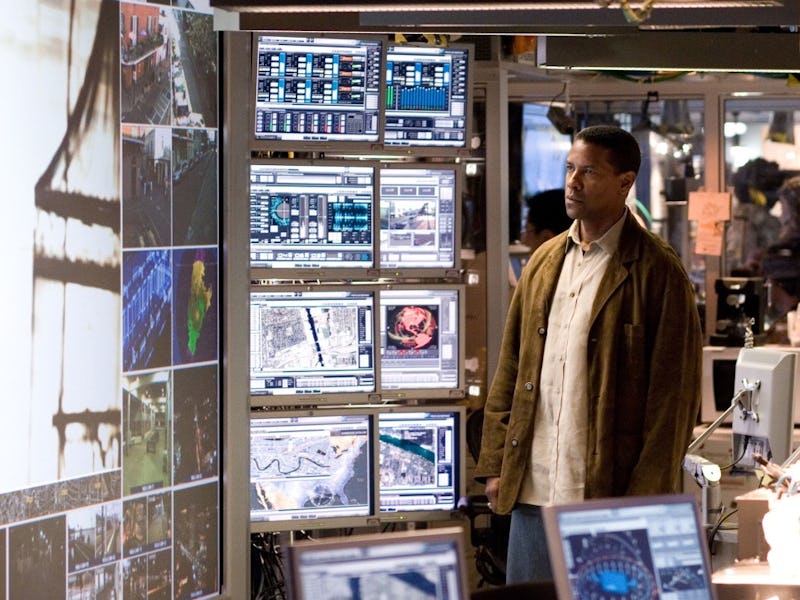Déjà Vu Just Joined the Criterion Channel, and Yes, it Belongs There
Return to 2005.

“I can see him. He’s right in front of me.” This line, spoken by Déjà Vu’s Doug Carlin (Denzel Washington) on a New Orleans expressway, is a staple of the manhunt genre. When our haggard detective finally gets a glimpse of their elusive target — in this case, an ATF agent hunting down a bomber who just destroyed a ferry full of servicemen and women — there’s often a moment of disbelief and sudden vulnerability. But there’s a deeper gravitas to Washington’s delivery, as Doug is observing the bomber, Carroll Oerstadt (Jim Caviezel), through a time window, using a special helmet to see Carroll four days before the attack. Doug hasn’t just made a breakthrough in the case; he’s seeing the impossible materialize in front of his eyes.
Doug Carlin has been folded into a clandestine surveillance unit that can see into — and theoretically interact — with the past, and is infuriated by the team’s reluctance to thwart the bombing before it can happen. Déjà Vu has just been added to the Criterion Channel’s collection of memory-themed films, and while Tony Scott’s pulpy, maximalist blend of manhunt procedural, Vertigo voyeurism, and time travel might feel out of place on the carefully curated platform, the film’s political resonance is plain to see today.
In 2006, America had survival on its mind. The war on terror created and depended on a nationwide feeling of a country on the defensive, a mindset used as justification for the invasions of Afghanistan and Iraq, and for an invasive surveillance policy that transformed how easily the state could gather intel on its citizens. Meanwhile, survival was an urgent and grisly problem for many Americans. When Hurricane Katrina hit the southeastern United States in 2005, federal authorities were criticized for the delay in repairing civil infrastructure and providing life-saving aid to a devastated New Orleans.
While Déjà Vu makes verbal and visual reference to Katrina’s impact on New Orleans, Scott’s film wasn’t designed as a commentary. Still, the troubling connotations of terror attacks justifying the rollout of experimental surveillance loom large with Déjà Vu’s marriage of post-Katrina imagery and a plot about the state’s failure to intervene in time. It’s conflicting to watch government agencies swoop into New Orleans to deal with the aftermath of a deadly incident, deploying state-of-the-art resources that wouldn’t exist if those in power didn’t see a use for their state-sponsored surveillance technology.
For the first stretch of the film, Doug believes the “Snow White” project is showing him a simulated version of the past, but even then, its invasive nature is concerning. Snow White scoops up images bounced between triangulated satellites to recreate the past with extreme precision, and when the program zeroes in on a local woman named Claire (Paula Patton) who was murdered by the bomber, we’re reminded of surveillance’s talent for turning human beings into data.
Doug certainly has his work cut out for him.
It profoundly strips them, alive or dead, of dignity and humanity — Claire cannot consent to her participation in this investigation. It’s an eerie truth that complicates Doug’s clear attraction to Claire, who evokes Jimmy Stewart in Hitchcock’s masterpiece of obsession, Vertigo, as he basks in her giant image brought back to life on screen. Is Doug entranced by Claire or her image? It’s hard to accept that Claire is just a data point when he can see her right in front of him.
After a suspicious Doug sees Claire react to a laser pointer he shines at the “simulation” and realizes the Claire on screen is truly alive in the past, the supposed limits of the technology give way to possibility, and Snow White’s refusal to prevent the bombing is revealed as pure rhetoric. To its personnel, their project successfully delivered the culprit, and it’s time to move on; only Doug believes that going into the past is a moral imperative. When Doug embarks on a lone time-travel mission to prevent the attack, Déjà Vu mounts its most convincing heroic argument of challenging that disasters had to play out the way they did, albeit in a way that doesn’t easily translate to reality.
Instead of detailing the institutional failures that lead to disasters, Déjà Vu offers an attractive fantasy: you can change the past, you can save people from becoming data, and the impossible can be prised from the hands of those who only look backward. That it’s possible for good, just people to reappropriate shady institutional power to defy reality and save lives that have been written off is a profoundly romantic conceit, but in the immediate context of Bush’s administration, this heroism makes Déjà Vu an exercise in genre cinema defying the punishing road laid out for America in the 2000s. Through visceral action and a propulsive story, Scott’s film creates survival out of fantasy. And we believe that, if we look at the images long enough, fantasy can become reality.